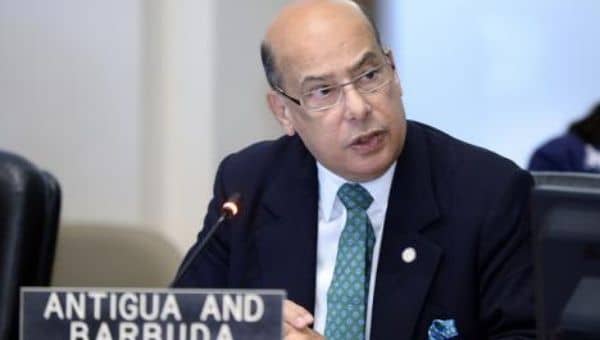
By Sir Ronald Sanders
(The writer is Ambassador of Antigua and Barbuda to the United States and the Organisation of American States. He is also a Senior Fellow at the Institute of Commonwealth Studies at the University of London and at Massey College in the University of Toronto. The views expressed are entirely his own)
P.J. Patterson, the former Prime Minister of Jamaica, recently observed to an attentive audience in Washington, D.C., the Capital of the United States, that: “We of the Caribbean should never allow our strategy to be dictated or determined by anyone else”, adding that “we live in no one’s backyard”.
Those words resound with a compelling freshness and significance today as the Caribbean is beset by forces that seek to divide and marginalize the region; to deprive it of a voice in global affairs that materially affect all its countries; and to treat the small, individual territories as nothing more than annoying complications.
Of course, leaders of Caribbean countries, particularly those that are members of the Caribbean Community (CARICOM), contribute to their own marginalisation and to the disregard shown to them by more powerful states or groups of states. In the conduct of their external relations, several governments, now and in the past, have pursued narrow, short-term interests, compromising their own sovereignty and weakening themselves and the entire Caribbean Community in international bargaining.
P.J. Patterson knows this well. He saw it first hand in several roles, including as minister of foreign affairs and foreign trade of Jamaica; as an opposition politician in Jamaica; and as Prime Minister. The tendency to eschew the strength of Caribbean-wide unity in favour of satisfying the self-interest of political parties has plagued the region to its detriment.
Several Caribbean governments have preferred to treat other Caribbean governments as their competitors and adversaries in order to gain short-term gains. This behaviour has been obvious in tourism, particularly in the cruise ship business, in which Caribbean governments have failed to form an alliance to withstand dictation from large cruise companies. The result has been that Caribbean countries earn a disproportionately smaller share of the earnings of the business.
But, the predilection to reject the strength of unity, or to bend to the will of external inrerests, in favour of opportunistic alliances with power-blocs – countries or companies – is not limited to sectors, such as tourism. They seem to be replicated across the board of non-domestic activity, resulting in insufficient trust in the CARICOM partnership.
P.J. Patterson spoke in Washington, DC at the launch of his book, My Political Journey, which chronicles his political life as a Jamaican politician, a Caribbean regionalist, and the role he played in fighting for respect for the Caribbean in the global community. It is a book that should be compulsory reading for all current political leaders in the Caribbean and every person who represents the interests of Caribbean nations in international bargaining.
In his book, P.J. states: “The assertion of our united voice as sovereign nations singing from the same hymn sheet is the only way for us to be heard in the global din”.
And, he knows with authenticity, born of lived experience, of the truth of which he speaks. He was an integral participant in the most significant demonstration of unity by developing states at a significant crossroads of their fortunes.
Ironically, that event occurred when Britain decided to join the European Economic Community (now the European Union). Preferential trade access to the British market was disappearing for Britain’s former Commonwealth colonies in Africa, the Caribbean and the Pacific (ACP), as responsibility for trade with Britain passed from London to the EU headquarters in Brussels.
The unification of the ACP countries was fashioned in the Caribbean as a single unit to negotiate a trade and aid pact with Europe.
The arrangement involved three regions, but one voice on each aspect of the negotiating pillars.
The Caribbean’s main spokespersons on behalf of the ACP group were Sir Shridath Ramphal and P.J. Patterson.
Many lessons arose for the Caribbean from those negotiations, not least that the unity of developing countries is a formidable force in bargaining with other countries and regions, much bigger and powerful than themselves.
It is no exaggeration to say that the Lomé Convention, that emerged from those ACP-EEC negotiations, continues to stand today as the most beneficial trade and development document ever signed by developing states. Its benefits, over more than four decades, should permanently flash warning lights to the Caribbean not to fracture their unity, and, instead, to maintain their solidarity.
Caribbean countries have a sparse box of tools from which to draw in advancing their national interests in international affairs. Fighting relentlessly for their sovereign rights is one vital tool they should never relinquish. P.J. Patterson states with no equivocation that: “While small and powerless states do not in fact receive equal treatment in the application of international law, we in the Caribbean who lack military power are nevertheless compelled to continue the search for that ideal in which the international system will uphold right over might and law over force”.
That is wisdom from an authentic voice speaking from Caribbean trenches in international battlegrounds that have not diminished. They have simply appeared in other forms such as: in the EU blacklisting Caribbean countries in language that pretends cooperation but actions that manifest coercion; in the World Trade Organisation where big countries deny justice to small ones; in the Organisation of American States where after more than 50 years of membership, the Caribbean’s development and security aspirations still play second fiddle to the political agenda of other countries; and in the lip service paid to the adverse effects of climate change that point like a dagger at the heart of the Caribbean’s existence.
In all of this, P.J. Patterson has long and often advocated, “there needs to be a cohesive and effective strategic alliance among small developing countries”. Such an alliance must be cemented, solidified and fortified first among the countries of the Caribbean.
Then, and only then, will Caribbean countries establish the means for true independence and sovereignty both politically and economically. Caribbean leaders of all political stripes have every right to engage governments of other countries in their economic interest. But, in doing so, they should be mindful that they have a responsibility to themselves and the people of the Caribbean to support each other first.
Responses and previous commentaries: www.sirronaldsanders.com
Advertise with the mоѕt vіѕіtеd nеwѕ ѕіtе іn Antigua!
We offer fully customizable and flexible digital marketing packages.
Contact us at [email protected]

















WELL SAID!!!
“…several governments, now and in the past, have pursued narrow, short-term interests, compromising their own sovereignty and weakening themselves and the entire Caribbean Community in international bargaining.”
Comments are closed.